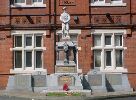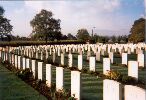
Newton-le-Willows and
Earlestown War Memorial

| OTHER WARS |
 |
Newton-le-Willows andEarlestown War Memorial |
 |
| The
Great War Roll of Honour |
|||||||||||||||||||||||||
2nd Lt. Graham was the son of Mrs Graham of 92, Culson Grove, Collins Green. He was formerly employed at the Collins Green Colliery.
He joined the West Lancashire Field Ambulance in September 1914. He was sent to France in January 1916, and was there until December when he came back to take up a commission. He was gazetted in April 1917 to the King’s Liverpool Regiment.
His obituary published in the NEG of December 1917 included a letter from Major Gerald M. Clayton, which said that “his conduct and leading of his platoon was magnificent. He captured a German strong point ahead of all other troops, and held the position in spite of no troops being on his right and left. It was largely due to his action that an important position was able to be taken – this being a high ridge for which the action was mainly fought.
His name is on the Menin Gate Memorial at Ieper, one of more than 54,000 officers and men who died in the Ypres salient before 16th August 1917 and who have no known grave.
The 18th Battalion were part of the 21st Brigade of the 30th Division. 2nd. Lt. Graham was killed on the first day of the Third Battle of Ypres, usually called Passchendaele. The Official History gives an account of the fighting involving the Battalion:
The 30th Division (Major-General W. de L. Williams) had the most difficult task in the II Corps. The best available division was needed. for the advance across the plateau. The 30th, mostly of Liverpool and Manchester battalions raised by Lord Derby, excellent though it was, had not yet recovered from the severe losses suffered in the Somme and Arras battles. A suggestion, made by G.H.Q., that a fresher division from the centre should replace the 30th Division was not, as time was short, carried into effect; but in compensation, a brigade of the 18th Division was allotted to it, to assist in gaining the more distant objectives. The 21st Brigade (Br.-General G. D. Goodman) was delayed at the exits of its assembly dug-outs by German shell-fire; it reached the starting line soon after the barrage had moved on, but the two leading battalions were unable to catch it up, owing to the wilderness of tree-stumps, shell-holes and barbed wire in Sanctuary Wood. Too heavily laden with equipment to negotiate such an obstacle at the pace of the barrage, the men entirely lost its protection. * On reaching the eastern edge of the wood they met fire from intact machine-gun nests on the Stirling Castle ridge, five hundred yards ahead. After an exhausting and costly advance over very heavy and broken ground, in which the support battalions detailed for the next objective became engaged, it was nearly 6 a.m. before the 21st Brigade won this ridge, including the castle ruins, where 44 Germans were captured. The barrage had meanwhile moved on to the second objective on the far side of the Bassevillebeek valley. Time after time attempts were made to press on without artillery support down the slope from Stirling Castle; but machinegun fire from the belt of strongpoints and concealed emplacements a few hundred yards away across the valley checked all of them with severe losses. A line was then consolidated approximately along the first objective from Bodmin Copse northwards to Stirling Castle.
* On 29th July Major-General Williams had told the Fifth Army
commander that he considered the rate of the creeping barrage, 25 yards a
minute, too fast for the infantry in his sector and advised 20 yards a minute.
The following morning he repeated the request for the alteration to the corps
commander, who replied that it was too late.